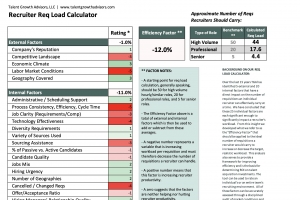Top Talent Recruitment: Four Ways to Repel Top Talent with Scarce Skills

This article first appeared on ERE.net
Let’s acknowledge that, despite our widespread desire to offer a great candidate experience to every applicant for every role, talent acquisition functions simply aren’t resourced to do so. Like every business and family, we have limited resources within which we must operate.
One option for managing this budgeting challenge — the traditional HR approach — is to spread our resources as thinly and as evenly as possible in an effort to achieve some kind of parity or fairness. This usually means making distinctions by level (lots of attention, resources and money spent on executive candidates, less so on professional and few if any on hourly candidates). However, the perceived importance of these levels themselves is a hold-over from, literally, the industrial era. Not only do level-based distinctions make little sense in our knowledge economy, using them as the foundation for your talent-acquisition strategy will repel the very talent that the business most needs to grow — talent that is not defined by the levels we created in the 1930s.
Managing talent-acquisition resources the old way — spreading resources thinly and evenly by level — is a sure-fire recipe to repelling the talent you most need. Here’s how:
Fail to Distinguish Roles by Business Criticality
In our knowledge economy, while all jobs are important (or else they wouldn’t exist), only some roles are critical to building business value (I’m going to talk about this more at ERE in San Diego). It’s different for every industry and company, but examples are R&D roles at a pharmaceutical company, buyers at a retailer, or engineers at a defense contractor. You can practically draw a direct line between the quality of talent attracted and retained in those roles — and the company’s enterprise value over time.
Talent-acquisition and HR professionals should initiate conversations with top leaders in order to enlist their help in prioritizing recruiting resources. Failing to do so means that TA teams are over investing in the hiring of some (probably less important roles) roles while under investing in other (probably more critical) roles.
Fail to Distinguish Roles by Talent Availability
The other essential distinction for effective recruiting is an understanding of the talent availability in the marketplace for the role.
Let’s face it: if you’re hiring a marketing coordinator, there is a lot more talent available than if you’re hiring a digital marketing strategy manager. You can post the job for the former and likely receive a plethora of qualified candidates, which will not be the case for the latter. In order to find the right qualifications and fit, you will have to research who is in that role in other organizations, talk to them, and then compel them to consider your opportunity and company. It requires a completely different approach to recruiting.
Fail to Prepare Hiring Managers for Interviewing Those With Scarce, High-demand Skills
It might be controversial, but we believe that not every hiring manager needs interviewing training — much less the same information, delivered in the same way. Going back to our previous example, the kind of prep the hiring manager for the marketing coordinator opening needs is significantly different from what the hiring manager of the digital marketing strategy role needs. Truly, the hiring manager for the marketing coordinator might simply need a team of three interviewers (including him/herself), 15-minute prep meeting beforehand, a concise and structured interview guide, and a formal, 30-minute debrief meeting after the candidates leave. Nothing crazy or involved.
The hiring manager for the digital marketing strategy role however needs to understand that you’ve (probably) been working this passive candidate for months, that he (yes, probably a “he”) has finally agreed to come in and interview, and that he’s probably going to take control of the interview and ask some really tough questions about the company and the opportunity. The hiring manager needs to know that this is *not* the time to be unprepared, to put his feet up on the desk, and ask the candidate, “So, why do you want to work for us?” Thorough preparation — including how to answer the toughest questions asked by the best candidates — and how to conduct a professional, job-related, and impactful interview is key to convincing the candidate to consider the opportunity.
Read the rest of this article at ERE.net
Want to chat? Contact us.
Share this Article
Learn more about our unique approach to Talent Strategy Formulation.



